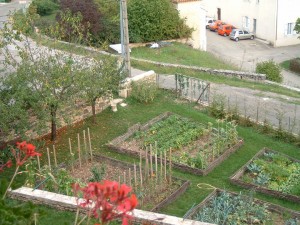Tuesday
Community ArticlesLiterally Cultivating Peace
By David Wimberly
When powerful drala and even awakened werma cry,
As earth’s ancient sacred living systems die,
Will Shambhala warriors touch the earth with exertion to apply?
And raise gardens of compassion invoking blessings from our warming sky.
Our Shambhala path empowers us as earth protectors, which demands that we practice. It is hard to visualize a more profound, direct, powerful and rewarding path of practice than raising Gardens of Compassion to feed ourselves and others.
Too often, people think that solving the world’s problems is based on conquering the earth, rather than on touching the earth, touching ground. That is one definition of the setting-sun mentality: trying to conquer the earth so that you can ward off reality.
– Chogyam Trungpa Rinpoche
As his life became short and it was important to give instructions vital to the survival and growth of Shambhala, Chogyam Trungpa Rinpoche exhorted us to garden food for ourselves and others. His Holiness the Seventeenth Gyalwang Karmapa also strongly supports gardening and responsible eating in his recently published “Environmental Guidelines for Karma Kagyu Monasteries, Centers and Community.”
Sakyong Mipham Rinpoche urges us toward peacekeeping. Military institutions worldwide point out that food shortages driven by climate change will be the single greatest cause of warfare in the century. Gardening – the creation of food – powerfully and directly creates peace.
There are all kinds of deodorant sprays to keep you from smelling the real world, and all kinds of processed food to keep you from tasting raw ingredients. Shambhala vision is not trying to create a fantasy world where no one has to see blood or experience a nightmare. Shambhala vision is based on living on this earth, the real earth, the earth that grows crops, the earth that nurtures your existence.
– Chogyam Trungpa Rinpoche
The global climate disaster is partly driven by methods of food production, harvesting and distribution that are dependent on the massive use of oil, gas and coal. We contribute to suffering every time we consume food shipped long distances, grown by conventional agriculture, heavily processed and packaged or extracted (pillaged) using systems destructive to the sea.
We can cut at the roots of this global habitual pattern by consuming food responsibly and with compassion. It is amazing how much food and beauty a small garden, even in an urban setting, can produce. A postage stamp of land or a spot on a roof can host a delightful raised bed with compact successions of delicious vegetables. To obtain the food we do not grow, we can support local, sustainable farming through responsible grocers, Community Supported Agriculture (CSA) and other creative ways.
You can learn to live on this earth: how to camp, how to pitch a tent,
how to ride a horse, milk a cow, build a fire.– Chogyam Trungpa Rinpoche
Consuming food responsibly and compassionately is worth our time and effort. It takes our Shambhala and Buddhist teaching out of the realm of theory into actual practice, benefiting all sentient beings. In fact, it is necessary for our earth’s biological systems and creatures to survive.
The Touching the Earth Shambhala Working Group is developing guidelines and templates to help our land centers, our urban centers and our members to become sustainable. We encourage and endorse all to plant Gardens of Compassion starting this spring, as an introduction and first step to sustainability.
No one knows for sure how bad the ecological catastrophe will be, but personal and community gardening combined with local food co-operation will be of immense benefit. It just could make all the difference in the world.
Even though you may be living in a city in the twentieth century, you can learn to experience the sacredness, the nowness, of reality. That is the basis for creating an enlightened society.
– Chogyam Trungpa Rinpoche
David Wimberly knew from a rural childhood his great aspiration to help the animals and plants of our world, particularly hawks and falcons. In 1974 he helped establish a research center in Costa Rica on sustainable agriculture and aquaculture that stimulated a cooperative movement there. His work as Co-Coordinator of The It’s Not Garbage Coalition (and numerous other groups) was pivotal in Nova Scotia’s use of clean composting as core to its Waste/Resource management system, often hailed as best in the world. David played core roles in stopping garbage, PCB and sewage sludge incinerators, yet always promoted sustainable alternatives. He aspires to helping find expressions of the Shambhala teachings to benefit all sentient beings, particularly in ways to help all people see their world as fully alive and to make decisions from a sane and awakened mind.
Editor’s note: This article is part of a trio on gardening that represent, respectively, Heaven (ground), Earth (path), and Man (fruition). The set is best read as a unified vision. David Wimberly’s article (ground) can be found here, Olivia Kirby’s article (path) can be found here, and Bob Cervelli’s article (fruition) can be viewed here.
Click here to read the entire teaching by Chogyam Trungpa Rinpoche, from which are drawn his quotes used in this article.







